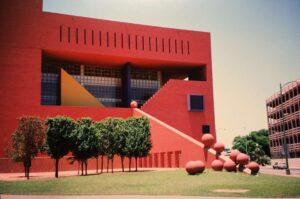by Charlene Sorensen
Services to Libraries, University of Saskatchewan
I am always curious as to how people find their way to librarianship. I myself didn’t plan on becoming a librarian. But suddenly after I completed my undergrad a friend was going to this thing called “library school” and I was intrigued. A couple of years later I decided to obtain my Library Technician diploma as a way to ease into library work and find out if I liked it. I worked as a library technician for three years and then decided it was time to get my MLIS. I can’t exactly remember why or how I made that decision but I knew it was the next step for me. I quit my job, moved away, and hoped to find work when I was done. I enjoyed library school – though I’m glad I chose a 12-month program – and did get a job right away. I worked some contracts and my first longer term job was as a serials cataloguer and I have thoroughly enjoyed where this fairly accidental career path has taken me.

San Antonio Public Library (Central) – San Antonio, Texas
I find that being a librarian permeates my life and defines me in many ways, even though I didn’t plan for this to happen. It affects what I read, some of my activities, who I spend time with, and many of my values and beliefs. Being a cataloguer also colours some of my day-to-day activities, probably in fairly stereotypical ways such as wondering why the KD isn’t beside the rest of the pasta in my grocery store – should they not be classified together?

Public library classification system – Albufeira, Portugal
When I came to the University of Saskatchewan, I was following this path of working with serials but I had now started along another track that I had never imagined – I was now a researcher. Even though I love being a librarian – and even find myself seeking out and taking pictures of libraries when I travel – I didn’t know much about librarians as researchers until recently. When I accepted a position at the UofS, I suddenly had standards for tenure to fulfill and not a lot of time to fulfill them. It really was a matter of jumping into the deep end and discovering that I COULD swim.

Bibliothèque Louis Nucéra – Nice, France
I have, however, been thinking more about what it means to be a practitioner-researcher librarian. I have an on and off relationship with this definition of myself and feel the need to embrace it more fully. Now that some time has passed, I’m hoping I can think more clearly about what I would like to do in this area of my work, and less about what I need to do to get tenure. I have the urge to wade more carefully into these waters and discover what’s there. And on a lighter note, I’m thinking about how this aspect of my career could/should be affecting my life like “librarian” and “cataloguer” already do.
And so I have questions for you, dear reader. How comfortable are you with defining yourself as a researcher? Do you see this aspect of your career come out in your personal life? Do we yet have stereotypical behaviours for librarian researchers, much like we have for other librarian roles?

Biblioteca Municipal Álvaro de Campos – Tavira, Portugal
This article gives the views of the author(s) and not necessarily the views of the Centre for Evidence Based Library and Information Practice or the University Library, University of Saskatchewan.

